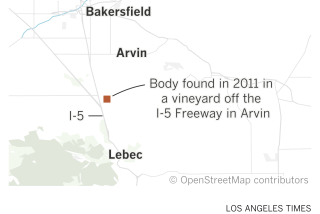Three years under a cloud of suspicion
Rina Pakula Klein, 41, trim, fit and dancing at a wedding days earlier, lay immobile and hooked up to tubes on a hospital bed.
She had arrived by ambulance at Cedars-Sinai Medical Center a day earlier after feeling “a pop” in her head. Persistent seizures followed, leaving her brain-dead.
Rina had seemed in glowing health. It made no sense. Her sister observed it was “awfully coincidental” that she had collapsed just as she was about to divorce her husband, and their mother agreed, Rina’s sister-in-law recalled.
Gary Klein, Rina’s husband of nearly eight years, did not hear the whispers. He sobbed and begged God to take him and spare the mother of his three young boys. His sister said she dismissed the dark allusions as symptoms of shock and grief.
But the bewilderment over Rina’s death did not go away. It gave way to suspicions that helped fuel a murder investigation by the Beverly Hills Police Department and the L.A. County Sheriff’s Department that persists nearly three years later.
Detectives have searched Klein’s home in Beverly Hills three times. His wife’s body was exhumed for a second autopsy. His two older boys were questioned at their elementary school. Did Daddy ever lock Mommy in a closet? Did Daddy have secret hiding places? Was Mommy ever black and blue?
Klein, 58, and his attorney have gone to court six times to learn the evidence against him. Judges, siding with police, have prevented him from seeing the last autopsy report or records supporting searches of his home, though he has not been charged with a crime.
The criminal probe has paralleled court fights between Klein and Rina’s family over her $2.8-million estate and visitation of his children, with a Beverly Hills detective even being called to testify in the estate litigation.
If Klein killed his wife, why hasn’t he been arrested? If there is scant evidence, why do police persist? Should detectives remain unfettered as long as they believe a slaying has occurred, even if they cannot prove it? Is an innocent man entitled to have his name cleared? How long should the family of a dead woman have to wait for answers?
Rina’s mother and sister, citing advice from police, declined to talk. Their statements came from probate and family court records. The police also refused to comment. Klein spoke without his lawyer in dozens of interviews.
With no end in sight to the investigation, Klein has lashed out. He has hired a truck to drive the streets of Beverly Hills with signs denouncing the police. He has filed a complaint against detectives and created a website, https://www.beverlyhillscopsgonebad.com, where he derides them as “Bozos.”
“I am just trying to do whatever I can to end this nightmare,” Klein said. “I don’t want my children to grow up thinking Daddy possibly murdered their mother. I can’t let it sit.”
::
Gary Klein met Rina Pakula on a blind date in September 2000. He was 48. She was 33, practiced law and lived near him in Beverly Hills. “She was very pretty and very personable, with smiles from ear to ear,” Klein recalled of the petite, brown-eyed brunet. She also was Jewish and Republican, a combination that suited Klein, the son of an Orthodox rabbi.
But Rina struggled with insecurity, a factor in the collapse of a first marriage after only months. Antidepressants and regular visits to a psychologist helped. She had also been diagnosed with lupus, an autoimmune disease, but showed few symptoms.
Klein, who grew up in the San Fernando Valley, had worked in the aerospace industry and opened an import business. By the time he met Rina, he was closing his business and investing in apartment buildings. Both wanted marriage and children. But Klein kept kosher and tried to avoid driving on Saturdays, while she had a more secular outlook. He worried “she wasn’t religious enough and we would have conflicts.”
Still, the couple soon married and settled in Klein’s two-story home. Rina became pregnant and plunged into despair when she stopped taking antidepressants. After the birth of their first son, postpartum depression crippled her. She hired a nanny and did not return to work.
“Rina was on a great deal of medicine for depression,” said Helene Klein, Gary’s younger sister. “She had medical issues, and if I fault Gary for anything, it is for not being aware of how ill she was.”
Rina complained Klein was a “control freak,” testified Anita Pakula, her sister. One of Rina’s physicians said in probate proceedings that she told him she had met another man. Her former boss testified she was considering divorce but feared Klein would take the kids and money.
Julie Pakula, 71, testified that Klein disparaged her daughter in front of the children, telling them “Mommy’s crazy,” and used religion and money to control her. “He put her down constantly, called her names,” Pakula said. Rina called her husband “Jekyll and Hyde,” described him as “evil” and feared he would kill her if he discovered her divorce plans, Pakula testified.
Klein said they never discussed divorce. He faulted himself for withdrawing — “I got tired of always being the cheerleader” — but insisted he was never cruel. Rina tended toward melodrama, he said.
But her sister testified that Rina told her, “Gary said that if he wanted he could kill her and no one would find out how it happened.”
::
Klein came home about 1 p.m. on May 29, 2009, a Friday. Rina was sitting in the kitchen with another mother whose child was there for a play date. They had called 911.
“Gary, I know you don’t believe me,” he recalled his wife saying. “I have had a stroke. We have to go.” Klein said she looked two feet to his side, her focus impaired.
In the emergency room, Klein said, a physician told him tests ruled out a stroke and asked to see Rina’s medications. She was taking prescriptions for depression, anxiety, lupus,a thyroid disorder and excessive sleepiness, Klein said. The doctor, he said, told him the drugs should not have been taken together.
Klein left Rina at the hospital with her sister and drove home to get her pill bottles. On the way back, his cellphone rang. “She coded,” his sister-in-law told him. When he returned, she still had no heartbeat. He said it took doctors about 35 minutes to revive her.
Offering little hope, one doctor asked about diet pills because a urine test had indicated the presence of amphetamines, Klein said. He recalled telling the doctor that Rina did not take them but had started medication for narcolepsy three months earlier after falling asleep at the wheel.
On Sunday, two days after her collapse, Klein and Rina’s family agreed to disconnect her from life support, Klein said. He sat with her after she died, he said, and kissed her goodbye.
Her mother and sister wanted an autopsy, according to court records, but Klein said he begged them not to let anyone “cut up my beautiful Rina.” Her doctor refused to sign the death certificate, and Klein agreed to a partial autopsy after meeting with a rabbi, he said.
Julie Pakula wanted to bury her daughter in a family plot, according to records in the grandparent visitation dispute. Klein said he consented but wanted her to sell him the adjoining plot. The day before the funeral, Klein received a letter from Pakula’s lawyer. It offered him the plot in exchange for visits with her grandsons. She later testified that Klein’s sister had warned that Klein might keep her from the boys, something the sister denied.
Klein continued to see his in-laws after the funeral. They met for Father’s Day at the Pakulas’ home. Then Pakula went to his house and took Rina’s prescription bottles without Klein’s knowledge, according to court testimony. Klein said he insisted she return the pills and write an apology if she wanted to set foot in his house or see her grandsons. She gave the pills to police.
On a sunny morning two months after Rina’s death, detectives knocked at Klein’s door. They had a copy of Rina’s first autopsy, which said she died of lupus. Klein recalled the detectives told him they needed “to dot the i’s and cross the t’s.” He took them to the backyard, where he said they asked if he and Rina had extramarital affairs. They did not, Klein told them.
When they returned to the front of the house, he saw a handful of unmarked police cars, three patrol cars and a trailer marked “crime lab.” He said a detective told him he had a search warrant. A record showed it was for a “suspicious death.” He said the police later asked him to take a polygraph. He called a criminal defense lawyer instead. That lawyer arranged for a private polygraph, which Klein passed.
When he went to visit his wife’s grave a week or so later, he noticed the grass had been disturbed.
::
The Pakulas sued for and won visits with their grandsons and challenged Rina’s will, which left her community property to Klein and their sons. The probate litigation revealed that Rina had kept assets secret from Klein and put them in a separate trust for the boys, disinheriting Klein and naming her mother as trustee. She also had safe-deposit boxes that Klein didn’t know about.
Klein saw his wife’s newly installed headstone months later. It named Rina’s survivors — except her husband.
Klein said his oldest boy, then 8, sensed the acrimony and asked questions. Klein recalled telling the boy that his grandmother suspected Klein of harming Rina. “How do I know if you are telling the truth or Grandma?” the boy wanted to know. Klein said he pointed to boxes of legal documents and promised his son he could one day read them.
More raids followed last summer, two years after Rina’s death, according to Klein and others subjected to searches. Search warrant records specified “187,” the penal code for murder. One of Rina’s former boyfriends said police took his DNA, suspecting he might have fathered her youngest son. Klein had his own DNA test. It showed he was the father.
Klein said mothers at his sons’ school told him detectives were still questioning them last fall. In late December, while Klein and his boys were on a Disney cruise, detectives went again to his house with a locksmith, Klein said. A search warrant record showed police were looking for evidence of computer hacking.
Klein said he had searched Rina’s email — he knew her password — after hearing in court that she wanted a divorce and had a boyfriend. The emails showed no evidence of either, he said.
He said he wants to be cleared to prevent his in-laws from using the probe as ammunition for continued visitation, which he is contesting. He also wants to ensure his sons have no doubts. He “needs to know he is not being hunted for a murder he didn’t commit,” said Mark J. Werksman, Klein’s lawyer.
Results of a second autopsy performed after the exhumation remain sealed, though someone with knowledge of the report said the cause of death was changed from lupus to undetermined.
Lt. Mark Rosen, a Beverly Hills police spokesman, noted there was no legal deadline for investigating slaying cases. “We are not going to do anything that jeopardizes the investigation,” Rosen said.
Klein now has a grave marker for Rina in his backyard. “Daddy’s Girlfriend For Ever and Always,” it says. He continues to wear his wedding ring, and Rina’s clothes remain in the closets. Photos of her are everywhere.
More to Read
Sign up for Essential California
The most important California stories and recommendations in your inbox every morning.
You may occasionally receive promotional content from the Los Angeles Times.











